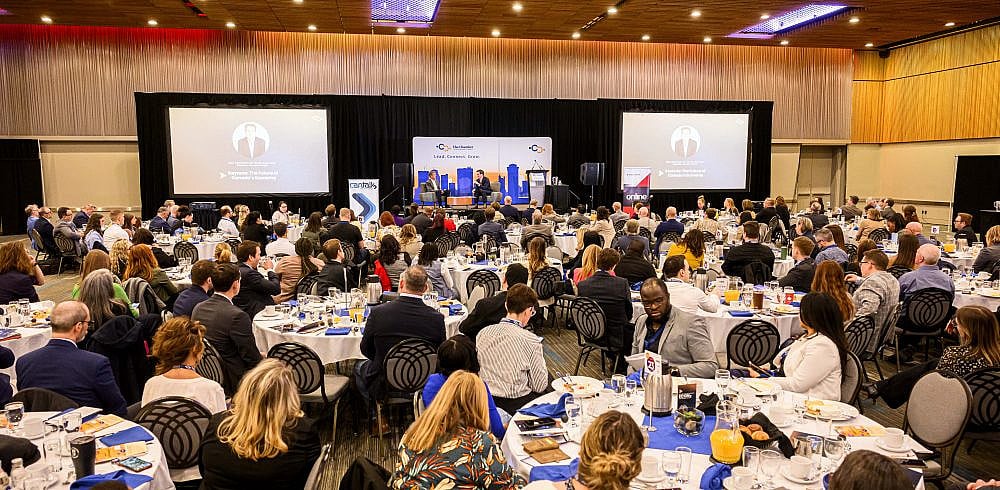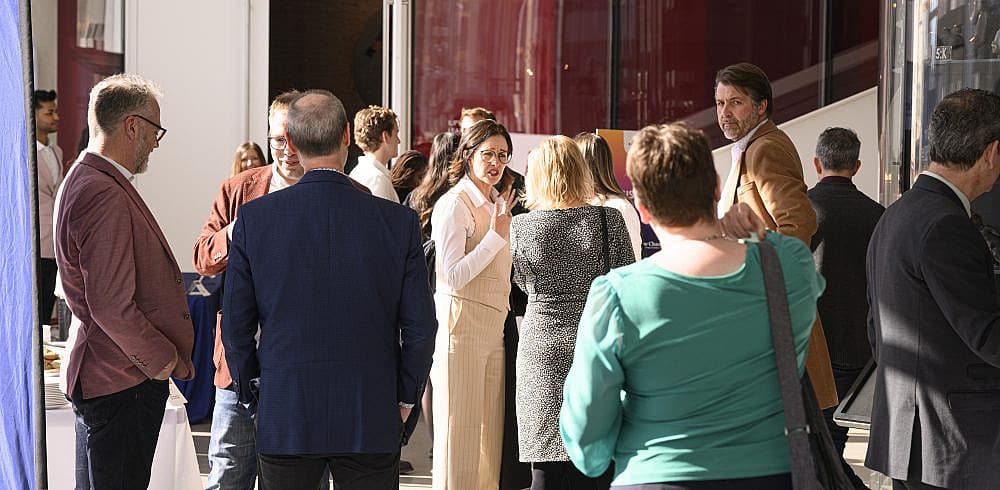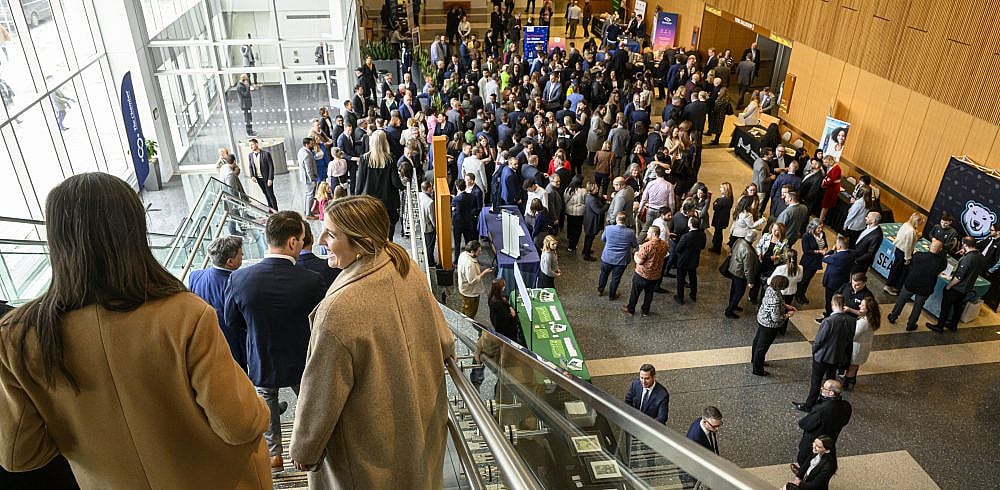7-minute read
Our Policy and Advocacy team has been busy connecting with members, meeting with government officials and finding more ways we can continue to advocate for you and your business.
Check out some of our advocacy in action below ⬇️
FEDERAL GOVERNMENT
Small Business Advocacy
On November 16, 2023, The Winnipeg Chamber held a productive meeting between our Small Business Advisory Council and the Honourable Rechie Valdez, Minister of Small Business.
 During the meeting, small businesses presented their challenges, including Canada Emergency Business Account (CEBA) loan repayments, increased crime and employee safety, lack of access to capital to scale up business, and supply chain disruptions related explicitly to transportation costs and the complexity of the Labor Market Impact Assessment (LMIA) approval process.
During the meeting, small businesses presented their challenges, including Canada Emergency Business Account (CEBA) loan repayments, increased crime and employee safety, lack of access to capital to scale up business, and supply chain disruptions related explicitly to transportation costs and the complexity of the Labor Market Impact Assessment (LMIA) approval process.
Over the coming months, The Winnipeg Chamber will continue to advocate to governments for resolutions that improve the business conditions for small businesses to thrive. Stay tuned for more public policy engagement opportunities.
Please visit the federal government’s Business Benefits Finder for small businesses seeking capital investment opportunities.
For chamber members wanting to bring forward small business policy challenges or concerns, please email Jamil Ahmed, Winnipeg Chamber Policy & Research Analyst, at [email protected].
CEBA Loans
Loren Remillard, President and CEO of The Winnipeg Chamber, continues to advocate for the federal government to extend the CEBA loan deadline by at least one year.
“The federal government needs to recognize that businesses are still in “recovery mode” and are facing cash flow problems, rising labour costs and inflation. Another year would allow those businesses to continue to manage their cash flow, drive some revenue, and start making those payments back where it doesn’t cause them to have to cut back,” he told CBC.
“Don’t make businesses have to borrow — at elevated interest rates — money to be able to pay back the loan to access a forgivable portion,” he said. “That would go a long way to help businesses get through this very difficult time.”
PROVINCIAL GOVERNMENT
State of the Province Address
On December 7, 2023, Premier Wab Kinew delivered his inaugural State of the Province address to over 1,300 business leaders at the RBC Convention Centre.
READ MORE HERE

Advocacy at the Leg
 On December 5, 2023, The Winnipeg Chamber attended Chamber Advocacy Day, organized by the Manitoba Chamber of Commerce. The event brought together representatives from fourteen chambers, fostering in-person discussions with Premier Wab Kinew, Ministers, and opposition members on shared priorities, ideas, and challenges shaping the business landscape in Manitoba. Central to the discussion was the pressing concern of healthcare and labour shortages, prompting strategic talks on harnessing immigration and foreign credential recognition to meet workforce demands – which The Winnipeg Chamber outlined in its provincial election platform.
On December 5, 2023, The Winnipeg Chamber attended Chamber Advocacy Day, organized by the Manitoba Chamber of Commerce. The event brought together representatives from fourteen chambers, fostering in-person discussions with Premier Wab Kinew, Ministers, and opposition members on shared priorities, ideas, and challenges shaping the business landscape in Manitoba. Central to the discussion was the pressing concern of healthcare and labour shortages, prompting strategic talks on harnessing immigration and foreign credential recognition to meet workforce demands – which The Winnipeg Chamber outlined in its provincial election platform.
During the day, we were pleased to meet with key elected officials, including:
- Honourable Wab Kinew, Premier of Manitoba & Minister of Interprovincial Affairs, International Relations, and Indigenous Reconciliation.
- Honourable Malaya Marcelino, Minister of Labour and Immigration
- Honourable Renée Cable, Minister of Advanced Education and Training
- Honourable Tracy Schmidt, Minister of Environment and Climate Change
- Honourable Jamie Moses, Minister of Economic Development, Investment and Trade, and Natural Resources
- Honourable Ian Bushie, Minister of Indigenous Economic Development, Municipal and Northern Relations
- Honourable Lisa Naylor, Minister of Transportation and Infrastructure, Consumer Protection, and Government Services
- Honourable Uzoma Asagwara, Minister of Health, Seniors, and Long-Term Care
- Jeff Wharton, Shadow Minister for Economic Development, Investment and Trade
- Grant Jackson, Deputy House Leader, Shadow Minister for Manitoba Hydro, and Shadow Minister for the Public Utilities Board
Beginning mid-November, The Winnipeg Chamber’s Board Chair, Jeanette Montufar-MacKay, President and CEO, Loren Remillard, and Director of Policy and Engagement, Kerry Harris, have been meeting with the Premier’s Cabinet Ministers to discuss upcoming agendas and priorities and explore any common ground with member priorities. Engagement will be completed by the end of January 2024.
On November 21, The Winnipeg Chamber attended the provincial government’s Throne Speech, titled “A New Day in Manitoba.” The speech acknowledged the challenges faced by Manitobans, such as increased wait times for health care, rising costs of living, homelessness and climate change. The business community welcomed the speech and saw it as a positive sign of the government’s willingness to work with them to address the province’s economic challenges and opportunities.
LOCAL GOVERNMENT
PolicyCONNECT: City Advocacy

On November 20, 2023, The Winnipeg Chamber held a private meeting between members and City of Winnipeg officials Hazel Borys, Director Planning, Property and Development, and Moira Geer, Deputy Chief Administrative Officer, where valuable discussions took place:
- Approval of the City’s Housing Accelerator Fund federal funding application (asking for $192M) will have a transformative impact on supporting the city’s housing needs, but the speed at which the federal government is forcing the city to deliver on the funding commitment (within three years) will create some significant challenges in delivering on the above actions including increased densification in certain areas, new infrastructure and public services required to accommodate the growth and new zoning rules.
- There is an imminent need for higher quality city services and an expedited city permitting process, with calls for a streamlined one-stop service.
- City plans for energy efficiency, a low-carbon economy, sustainable building codes, Manitoba Hydro Supply, and capacity maps.
The Winnipeg Chamber will continue to leverage its strategic partnership with the City, advocating to ensure that the private sector is consulted on changes to design standards and regulatory frameworks, provide clarity on infrastructure mapping, zoning conditions, and roadblocks, and shares their solutions to improve city processes and services.
Meeting with Mayor Gillingham
On December 12, 2023, The Winnipeg Chamber’s Board Chair, Jeanette Montufar-MacKay, and Director of Policy and Engagement, Kerry Harris, met with Mayor Gillingham to discuss Budget 2024-2028 and the critical role the City plays in ensuring Winnipeg is the easiest city in Canada to do business, emphasizing the importance of encouraging a culture of high-quality, efficient service and stronger collaboration within city departments.
We also discussed continued collaboration around shared priorities, including downtown, ending homelessness, enhancing the City’s revenue through negotiating with the province, transportation, transit, enabling active mobility and the movement of goods. The Winnipeg Chamber values the open and transparent dialogue with Mayor Gillingham and looks forward to collaborative opportunities to assist the City in building a more inclusive and more prosperous city in the years ahead.
POLICY
Youth Insights
On November 21, 2023, The Winnipeg Chamber successfully collected policy data insights from 61 youth at the Louis Riel School Division Career and Post-Secondary Symposium to understand their economic, social and environmental concerns.
Here is what we heard:
- The majority of youth (85%) expressed interest in participating in a Chamber Youth Policy Lab to bring forward innovative ideas and solutions to policymakers that support economic, social and environmental issues.
- Communications and Public Speaking was identified by youth (34%) as the top skill development for them to be able to participate in policy discussions, followed by networking (24%), research and analysis (19%) and information sharing (19%).
- The top three challenges/barriers youth face when engaging in policy discussions are fear of public speaking, lack of knowledge on policy issues, and lack of time.
- The top three policy topics of youth, according to their level of interest and importance, are education, health, and environment.
- Specific community issues that youth felt were inadequately addressed by the government include homelessness, education, rent, supporting queer and trans rights, human rights, and mental health.
- 38% of youth identified advocating for youth issues as the top role of the Youth Policy Council in the broader community, followed by community education and awareness.
- Workshops and training, networking events and mentorship programs were highlighted as the best way for The Chamber to engage and support youth in the ongoing policy development process.
State of Canada’s Cities Conference
 On November 30, 2023, The Winnipeg Chamber was pleased to attend “At the Crossroads: Summit on the State of Canada’s Cities,” hosted by the Canadian Urban Institute (CUI) in Ottawa.
On November 30, 2023, The Winnipeg Chamber was pleased to attend “At the Crossroads: Summit on the State of Canada’s Cities,” hosted by the Canadian Urban Institute (CUI) in Ottawa.
The event brought together 300+ city builders who are passionate about the challenges and opportunities facing Canada’s urban spaces. Common themes across the panels: moving policy into action, tapping into the right data to guide decisions, and partnering across all disciplines and sectors.
The 2023 summit marked the official launch of CUI’s first State of Canada’s Cities Report, a call for clear and practical change considering decision-making, policymaking, investment choices, business practices and community norms.
Key takeaways:
- The relationship between provinces and municipalities must be more systematic. It is ad hoc, in so many cases, a bickering about money. Not enough structure. There must be a reform to the fiscal relationship between these two governments. Many parts of Canada envy the attention and funding commitments QC municipalities get from the province of QC.
- Cities must be at the table to support provincial and federal government objectives. For example, discussions around federal and provincial programming often do not include cities and do not correspond with what cities need.
- There is a fiscal imbalance between the levels of government. Municipalities must increase their revenue sources – more solutions must be sought with the private sector.
- City managers talked about real activities happening at the grassroots and community levels, and citizens need to start being connected to these activities.
- Canada is not doing well compared to our peers in building an economic strategy for the 21st century. What is Canada’s vision, and how do cities fit into it? Stressed the importance of an economic strategy for the city and province as it will affect our ability to participate in a global economy.
- Rebuilding an economy must happen in cities because that is where innovation happens – that is where new stuff gets thought of – cities are living labs where we can undertake “small experiments with radical intent” to show proof-of-concept and then identify the elements that will give the ability to scale up.
- National policies are not working at the local community level. For example, there is a significant national policy bringing many newcomers into Canada, but cities are not provided with the funding to provide the necessary support when they get into a city.
- Provinces must adopt a metro mindset to achieve better progress on their targets. For example:
- Transition to a knowledge economy, issue with physical capital, but growth in human capital resides in our cities.
- Innovation economy – companies that profit from data and IP are primarily located in cities. We need to get serious about growing our economy and enhancing labour productivity.
- Healthcare underlines most city issues. The future of healthcare is tech and AI data-oriented. It must be prioritized in provincial and city economic development strategies. There was one healthcare provider in the room.
- Increased dedication to include more creative thinking into how to solve systemic changes. In Alberta, a $1M into the energy sector will create two jobs, and a $1M into the arts sector will create 20 jobs. Creative thinking can bring technical solutions to a city and communities and unite cultures for peace and development.
- Housing crisis raised in almost every discussion:
- Local urban governments with air rights and regional governments with ‘greenfield’ land suitable for housing development can collectively recruit, engage, do product and finance innovation and ultimately do preferential development permitting with a community of development practitioners that will build what is needed.
- For those most in need, there is a big problem for inclusiveness and a neighbourhood where everyone can live. A house makes more money than a teacher. That is a broken system.
- Provincial governments can protect and insulate cities and acknowledge that they need their budget. Also, there needs to be increased private sector partnerships with non-profits.
- Universities currently receive no assistance from any level of government for the provision of housing for students. Colleges have a lot of land, but how are they capitalizing on it for continuing care, housing, etc? These institutions need to engage governments on what they need to support the housing crisis.
Stay tuned for a policy brief with recommendations to governments on stitching the narrative to build better cities.




